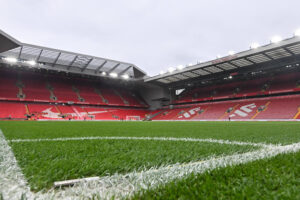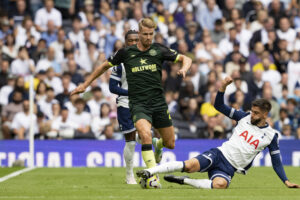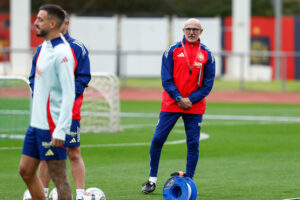Bolton Wanderers owner, Ken Anderson, has come under fresh scrutiny amid a financial crisis that has resulted in players and staff not being paid. Players and coaches have not been paid for four weeks, and this meant their fixture against Brentford was postponed.
The EFL has given Bolton Wanderers a misconduct charge and will be referred to an independent disciplinary commission. The Bolton players have refused to fulfil their playing duties until they receive their missing wages.
Bolton Wanderers will be playing in League One next season and it is not yet clear who the owner will be. Anderson’s reckless ownership could see Bolton face administration if he cannot reach an agreement to sell the club. In which case, Bolton Wanderers would take a points deduction into League One. It is a despairing situation and fans are calling for improvements to the system.
Failure of Bolton Owner Ken Anderson Raises Questions Over EFL Vetting Process
The Owners’ & Directors’ Test
To become a chairman or director of a football club a person must pass the owners’ and directors’ test. The test has been in place since 2004 and helps protect clubs against corruption, protect the image of the sport, and keeps unscrupulous people away from football ownership. The test focuses largely on the financial and criminal background of the applicant, but could the FA and EFL be more invested in protecting football clubs from incompetent ownership?
Football clubs are more than just a regular business, and fans are arguing that football clubs need protection against reckless owners. Football clubs are emotional property with a meaningful history and heritage. The fans, the history, and the tradition are part of the club.
As an owner, you are merely a custodian of that club charged with protecting its values and wellbeing. Owners and directors will have different reasons for purchasing shares in a club. While some owners do have the club’s best interests at heart, there are many that see a football club as a potential cash cow.
The Flimsy Vetting Process Has Caused Some Clubs to Descend into Chaos
The EFL has seen some truly bizarre owners that have plunged clubs into turmoil. These rogue owners expose the glaring weaknesses in the owners’ and directors test.
Edin Rahic – Bradford City
Bradford City have seen a phenomenal decline, regressing from playoff finalists in 2017 to bottom of the league and relegated in 2019. Edin Rahic, with no experience in running a football club, made wholesale changes to staff and infrastructure with no oversight.
Rahic was a partner to the majority shareholder, Stefan Rupp. With Rupp being the financial provider, Edin Rahic was left presiding over the footballing aspect of the club. Rahic used a hands-on approach, even demanding his own training routines be employed. Whilst in charge Rahic named seven managers, some being named as head coaches. The new title of ‘head coach’ came with restricted powers, allowing Rahic to further his control.
A run of poor form led to the sacking of fan favourite manager, Stuart McCall. Simon Grayson was McCall’s replacement but Grayson rejected a permanent contract at the end of the season. After a six-week search, Rahic opted to hire Michael Collins, a 34-year-old former player with zero management experience, as head coach. Michael Collins’ Bradford side suffered early setbacks and Edin Rahic made a decision to replace Collins after just seven games.
It took the former owners, Mark Lawn and Julian Rhodes, almost ten years of hard work to create financial stability, slow progression and managerial stability at Bradford City. Edin Rahic took just two years to undo it all.
Francesco Becchetti – Leyton Orient
Leyton Orient saw a rapid decline under the erratic owner, Francesco Becchetti. In three years Orient were relegated twice and had 11 managers. Becchetti’s lack of footballing knowledge led to the clubs demise. Leyton Orient are free of Becchetti, with American Businessman, Nigel Travis, swooping in to save the London-based club. With Travis at the helm, Leyton Orient now sit on top of the Conference Premier League and look set to return to the EFL.
Becchetti signed a fellow Italian, Fabio Liverani, as the manager. Liverani could not speak English and looked completely out of his depth. This caused a systematic breakdown of the dressing room atmosphere. In December 2015, Becchetti lashed out by kicking Orient’s then assistant manager, Andy Hessenthaler.
Oyston Family – Blackpool
A high court judge found Owen Oyston and his son Karl, the former owners of Blackpool football club, guilty of illegitimately stripping the club of £26.77 million. As a result, the rift between the Oystons and the fans widened and the club suffered relegation. Fans would often congregate, outside the club’s stadium, around the statue of Blackpool hero Stan Mortensen. The Oystons responded by removing the statue. Karl Oyston even tormented fans, by driving a car with an ‘OY51 OUT’ registration.
Blackpool fans are enjoying some karma after the Oyston’s own removal from the club. However, it looks unlikely Blackpool will fully recover from the Oyston reign and make a return to the premier league.
How Will the FA and EFL Look to Protect Clubs From Dangerous Owners?
The EFL pledged to consult with clubs, during the 2017/18 season, about the effectiveness of the test. And while a series of amendments have strengthened the test in the meantime, fans have voiced their concern on social media over the legitimacy of the test. The EFL has improved the vetting process but there are few people who fail the test, many clubs have suffered.
If a club degenerates, due to poor ownership, should the EFL intervene? Or has football always been survival of the fittest?
Main Photo
Embed from Getty Images






